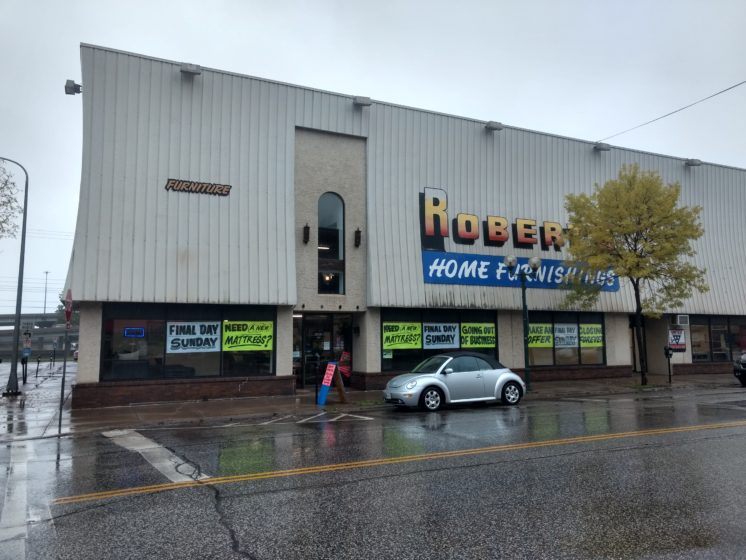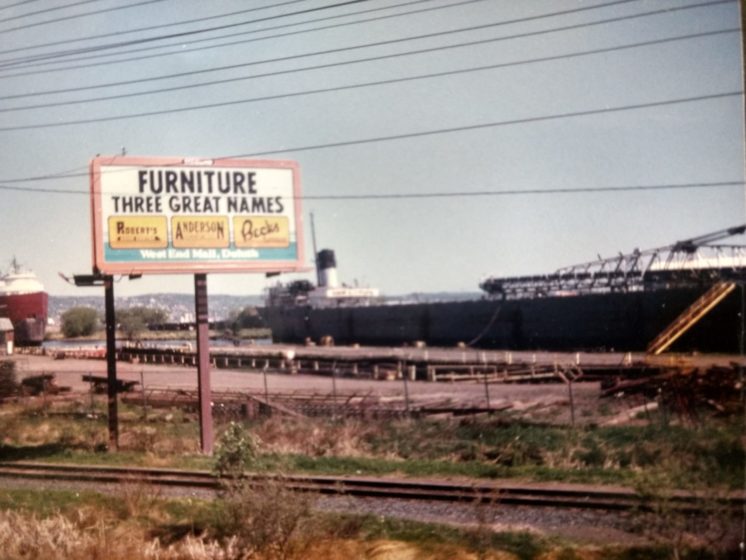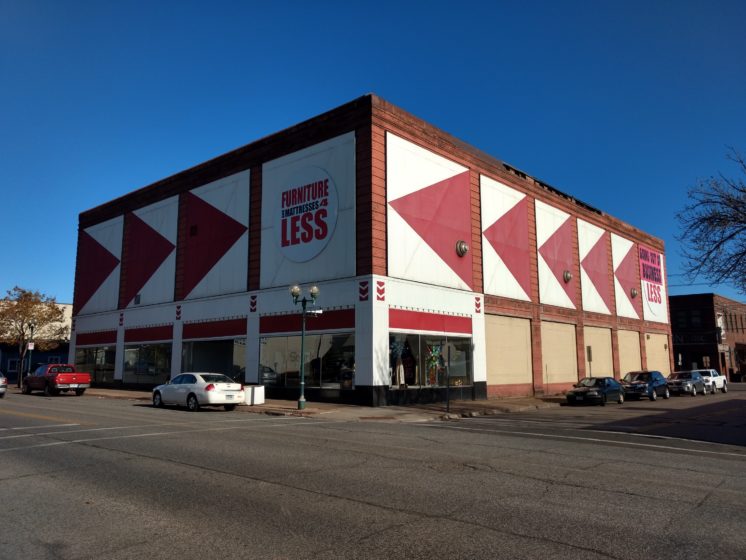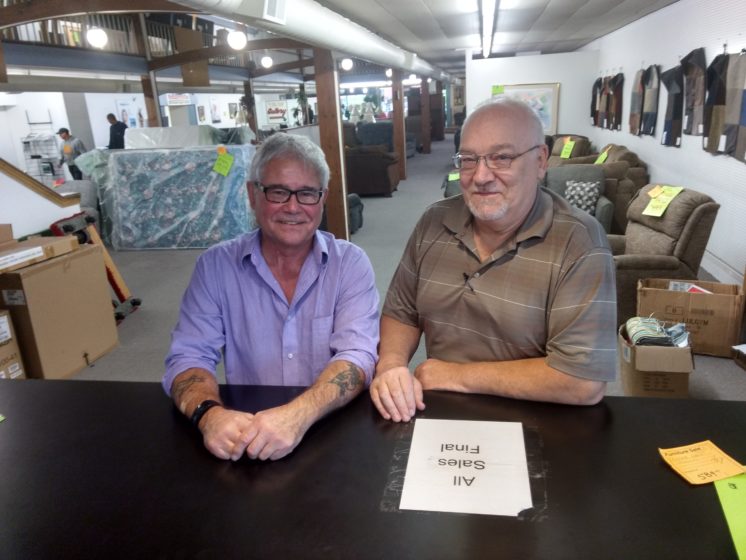Lincoln Park craft district booms; West End furniture row dies
Before Lincoln Park became a craft district lined with trendy breweries, colorful boutiques and new restaurants it was called the West End — where furniture was king and Duluthians shopped for sofas, beds and dining room tables. Those days are pretty much over.
The West End featured three competing furniture retailers stationed in three large, multi-story turn-of-the-century buildings. It also included smaller home goods stores mixed with other typical “main street” businesses lining a stretch of Superior Street around its 20th Avenue West intersection. All that remains of the furniture stores are Anderson Furniture and Happy Sleeper.
“When we first started out we actually had six furniture stores in a two-block area. This was the furniture capital of Duluth, Minnesota,” said Robert’s Home Furnishings owner Bob Rothenberger. “There was no stores on the hill.”
And there were no organic ice cream shops, raspberry sour ales on tap and Lincoln Park mural tours in the area either.

Robert’s Home Furnishings has closed its doors. A furniture store has occupied the address for decades.
Rothenberger started working in the West End furniture district almost 50 years ago and launched Robert’s Home Furnishings in 1987. After building a furniture empire that included as many as five stores in northern Minnesota and western Wisconsin, Rothenberger planned his retirement this past summer and closed his last business at 2102 W. Superior St. in October.
No plans have been announced for the large two-story former lumber building — one of three anchors to the famous and now fading West End “furniture row.”
“I actually go back to the Curtis Mathes days on the corner, that was a way long time ago,” said Rothenberger, referring to an old Superior Street television store. “This is the old, old days now. (The West End) even used to have a furniture store at the old (Esmond) hotel. We had them all over the place.”
Former Duluth News Tribune journalist and West End native Jim Heffernan said more than a half-dozen Superior Street furniture stores are listed in a city directory he owns from the 1940s. Enger & Olson, Beck’s, Anderson, Johnson, Frank E. Kell Furniture and others all had addresses on Superior Street from 18th to 21st avenues west.
“That was furniture row,” said Heffernan. “Some of their advertising went together to get people out there. They called it: Furniture Row.”
The roots of the West End furniture row stretch back to the turn of the century. Business partners Emil Olson and Hagbert “Bert” Enger opened a furniture store at 1722 W. Superior St. in 1902. Records show Charles O. Nelson Furniture could also be found in the neighborhood around the same time.
According to the Duluth history website Zenith City Online, Enger & Olson moved operations around the neighborhood before leasing space in the U.S. Block at 1826–1832 W. Superior St. in 1909. The partners bought the building and a warehouse behind it at 1832 W. Michigan St. 10 years later.
Today the old Enger & Olson warehouse on Michigan Street is the Bent Paddle Brewing tap room.
Heffernan said the Enger & Olson store was the premier place to buy furniture in Duluth for decades. A dining room table purchased by his parents there in 1932 has become a family heirloom. The three-story, 42,000-square-foot building featured a display bungalow built inside it so customers could see sofas, chairs and window treatments in their element.
According to Zenith City Online, Enger became a generous Duluth benefactor, donating money for a Skyline Drive property purchase where the city erected a tower and built a golf course in his name. He also funded the purchase of a replica Viking ship that was displayed in Leif Erikson Park for 50 years.
“He was so successful that he made his fortune selling furniture at that (Superior Street) address,” said Heffernan. “It’s a total assumption on my part, but others saw him out there and thought: ‘Well, we can sell a lot of furniture in that part of town.”

A billboard advertised the “big three” West End furniture stores near the Duluth harbor some 30 years ago. (Photo courtesy Bob Rothenberger)
By the time Rothenberger came along, the West End had developed three large furniture stores: Beck’s, which took over the Enger & Olson store; Anderson Furniture, still in business at 2032 W. Superior St.; and Joel Bodin Home Furnishings, the store he took over and turned into Robert’s Home Furnishings.
Rothenberger said the businesses thrived on competition and cooperation to bring customers into the neighborhood.
“We all got along great because we all did great,” said Rothenberger. “It was a one-stop shop. We all had different lines and different things so we were the ‘Big Three.’ That was huge. We had a billboard right as you came into Lincoln Park … Three names: Robert’s, Anderson and Beck’s. That goes way back. We were the Big Three, just like the car dealerships.”
The opening of the Miller Hill Mall in 1973 eventually led to a slow but steady decline for the West End furniture row. Rothenberger said half of his potential customers stayed on the hill to shop.
“Then we had the Menards, Fleet Farm, you got this one, that one, Shopko, I could just go on and on for hours on the stores,” he said. Internet shopping provided the final blows not only to furniture row but big stores like Sears and Kmart. “It affects everyone,” said Rothenberger. “It’s sad to see.”
Heffernan said the West End struggled through dark times for more than 20 years with dingy bars, empty storefronts and a bad reputation until new business leaders renamed the area. A city council action in 1995 turned the West End into Lincoln Park, named after a neighborhood park along Miller Creek. By 2014 the term “Lincoln Park Craft District” was being applied to the area around the 1900 block of Superior and Michigan streets.
“It’s wonderful what’s happening there,” Heffernan said. “Of course, furniture row has virtually disappeared, but look what’s there, it’s exciting … I’m just tickled to see it’s become such a vibrant area now for restaurants and, of course, breweries, even that folk school.”
Rothenberger agrees. He said new businesses like OMC Smokehouse and Caddy Shack Indoor Golf and Pub have been great new additions to the neighborhood.
“We’ve seen a lot and lot of businesses come and go over the years,” he said. “They’re really going to make some changes, develop the area. There will be some new interesting ideas coming to Lincoln Park.”
Anderson Furniture, the last remaining Lincoln Park furniture giant, has carried on through the Lincoln Park rebirth. The store has changed hands over the years and is now owned by Duluth resident Ed Aamodt, proprietor of the nearby kitchen and bath business Arrowhead Supply. While neighborhood competitors have disappeared, Anderson Furniture officials say its vast, five stories of inventory will be maintained now and in the future.
“We’re optimistic,” said store manager Joe Melquist. “We see a lot of good growth coming into the area and that’s good for us. All the new businesses coming into the area are drawing in new customers.”
And now one of the old “Big Three” buildings will host one of those new businesses.
The former Enger & Olson building, which eventually landed in the hands of Johnson Bros. Furniture, has a new owner with no interest in selling sleeper sofas, night stands and floor lamps.

The Furniture and Mattresses 4 Less building at 1826 W. Superior St. was recently purchased by Spark Works Co. and will be a collaborative work-space venture.
Duluth-based entrepreneurial startup Spark Works Co. purchased the Johnson-owned building at 1830 W. Superior St., most recently home to Furniture & Mattresses 4 Less, in October for $650,000. It is the second large Lincoln Park building purchase for the company this fall.
Spark Works purchased the former Trinity Lutheran Church at Third Street and 27th Avenue West in August.
Spark Works CEO Augie Andersen said both buildings will feature collaborative work space for a new generation of independent, technology-based entrepreneurs. While the old church lends itself to performance and lecture space, Spark Works is exploring housing and retail options for the old Furniture and Mattresses 4 Less.
“It’s not going to be one big furniture building anymore,” said Andersen. “It’s going to be more of a community hub happening here.”
Andersen said the building will include a mix of retail space — either one large anchor tenant or several smaller stores — to blend in with the prevailing craft element in Lincoln Park. Overall, it will be a place for independent workers to get things done.
Collaborative work space offers a clean, quiet and always available work environment. Meeting rooms, printers, wi-fi and other technology are provided in a space shared by all.
“There’s the idea of shared amenities, but mainly it’s about the community of people,” said Andersen. “Often in the co-working space you find this ecosystem of people has formed and they are working together rather than alone.”
Andersen, a Cambridge, Minn. native and College of St. Scholastica graduate, worked as a software engineer for a time before getting into real estate and discovering a need for more co-work space in Duluth.
He was instantly attracted to the enthusiasm, creativity and collaboration found in Lincoln Park, perhaps a remnant of the old West End furniture row.
“You get to see that the business owners here are collaborating with one another to make this neighborhood a success. It’s pretty awesome,” said Andersen. “That’s the type of community that these co-working spaces foster. That it was already here in this neighborhood was pretty remarkable. It’s wonderful to see.”
Recommended Links:
Leave a Comment
Only registered members can post a comment , Login / Register Here
















3 Comments
Paul Lundgren
about 5 years agoPaul Lundgren
about 5 years agoPaul Lundgren
about 3 years ago